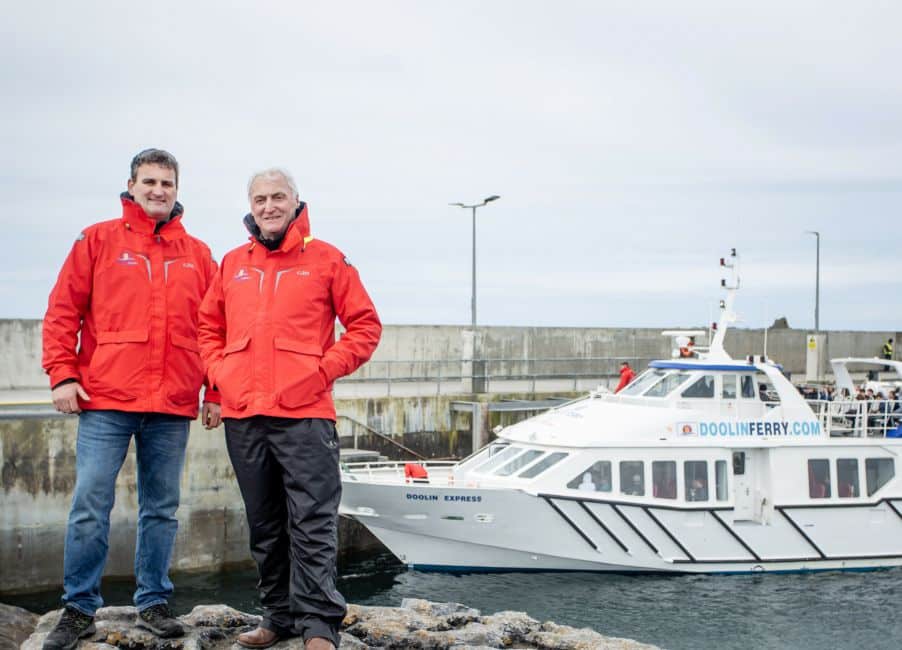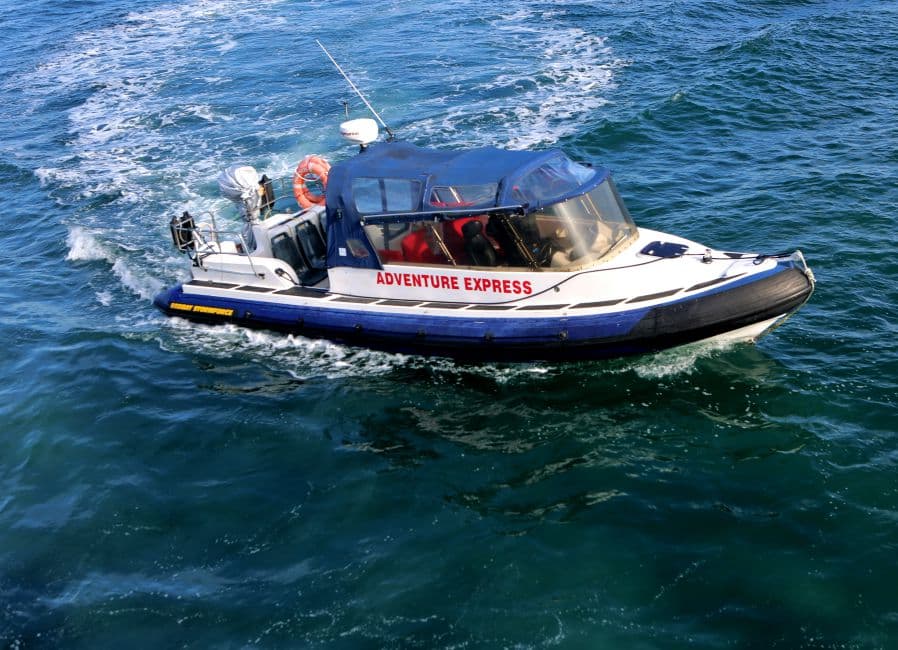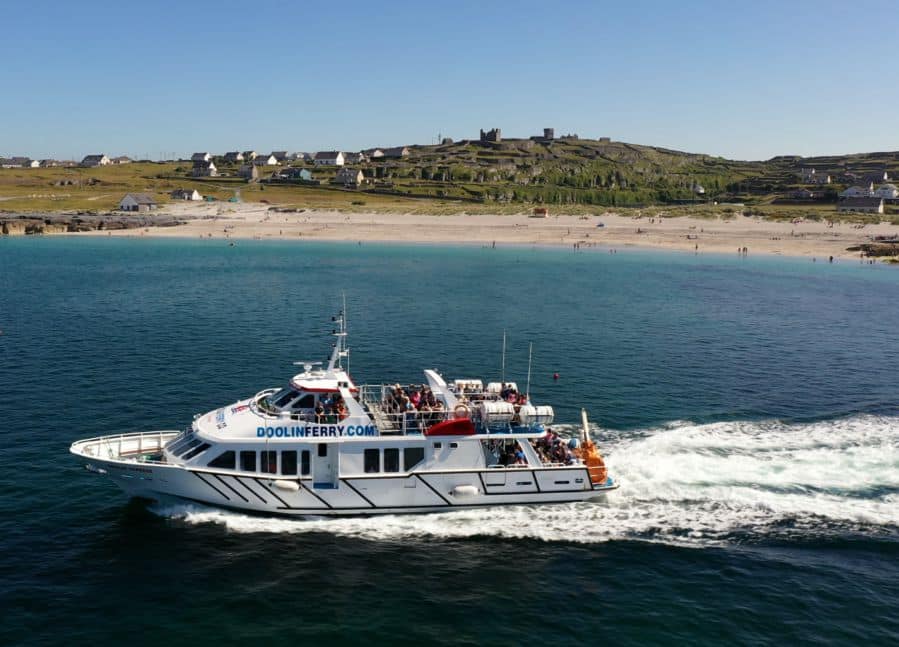The recent purchase of Doolin2Aran Ferries by its Clare competitor Doolin Ferry Company arose from deep thinking inspired by the Covid crisis. Director Liam O’Brien told Basil Miller how the deal came about
“We might have failed,” says Liam O’Brien, thinking back to when Covid-19 struck early in 2020 and put his Doolin Ferry Company at serious risk of going under. When the March 2020 Covid lockdown was announced, the firm had to refund €55,000 to clients who had booked voyages on its boats for the 2020 season.
Advance booking fees are important, with the cash going to maintaining vessels through the off-season, and stocking up on fuel. It looked like touch and go to O’Brien and his wife Erin, co-founder and equal owner.
Two years later, the O’Briens’ business has not only survived but they have also taken over the Doolin ferry service operated by its main competitor, Liscannor Ferry Company or Doolin2Aran Ferries, also based at the new pier in Doolin, Co Clare, taking passengers to the Aran Islands and for tours of the Cliffs of Moher.
“It was the two tough Covid years that made us all think,” says O’Brien, chief executive of the tourism operation they set up in 2012. He confides that in 2020, with a virtual cessation of air travel, “we might have failed”.
O’Brien acknowledges that government supports for employees and for business saved the day for many tourist businesses, and his own case both the firm’s bank at the time, AIB, and Fáilte Ireland provided necessary support as well.
That kept the business afloat long enough to benefit from the 13 weeks later in the summer of 2020 when lockdowns were lifted and his boats were full. All that thinking he mentioned went on into 2021, which brought more lockdowns, more refunds to booked clients, and an equally truncated season, again with thankfully full boats. But what would the future hold?
Early this year then, thinking done, the O’Briens approached the Garrihy family, owners of Liscannor Ferry Company Ltd, to propose a takeover of its Aran ferry service. Joe, PJ, Eugene and Donie Garrihy, who established their venture in 1999, “were reluctant at first,” says O’Brien.
He didn’t press them, just let the hare sit a while, but stayed in touch. And then the discussions got serious, until the Garrihys, whose operation was carrying 100,000 passengers annually before Covid, agreed to sell their Aran ferry assets.
Doolin Ferry Co acquired two high-speed ferries, Star of Doolin and Spirit of Doolin, which can each carry 200 passengers, and Doolin Discovery, a smaller 72-seat vessel used mostly for trips to the Aran island nearest to Doolin, Inis Oirr. Also sold by the Garrihys to the O’Briens were offices and equipment relating to the ferry service.
“Following the acquisition we have 11 boats,” O’Brien explains. “That gives us spare capacity and means we can increase the frequency of our sailings in response to demand, and we can allocate vessels of various sizes depending on bookings.”

It wasn’t a hostile takeover in any sense, but the two companies were competitors, which was a factor when it came to financing the deal. O’Brien explains that from 1972, when his father Bill started in the business, the banking relationship was with AIB.
When Liam and Erin founded Doolin Ferry Company in 2012, they continued with that arrangement, as the family business had enjoyed good support from the bank. In 2019, Doolin Ferry Co invested €1.6m in new vessels with the bank’s support.
Doolin Ferry Co is the trading name of Báid Farantoireachta An Costa Teo, and as is normal for a commercial boat operation there were several charges against their main vessel, the Tranquility. Now there are similar charges against the acquired vessels — but all with Bank of Ireland.
According to O’Brien: “We went to AIB with the proposed deal, but there were a number stipulations, one of which was a deal breaker. The bank wanted us to make available three years of Liscannor Ferry Company’s accounts.
"I explained that while the deal involved a transfer of assets, they were our competitors. What if the deal fell through? Then we’d be privy to their sensitive commercial information and could use it to our benefit. That just was not going to happen.”
The O’Briens turned to Bank of Ireland instead. With the bank’s support, and the company’s own resources, the deal was done, leaving Doolin Ferry Co with a total of 11 vessels and no local competitor.
Both companies had been stretched by the Covid crisis. Liscannor’s €41,000 profit in 2019 turned to a loss of €151,000 in 2020, while Doolin Ferry Co’s surplus of €112,000 in 2019 turned into a loss of €201,000 in 2020.
O’Brien believes the consolidated company will be able to operate more efficiently in many ways, with benefits for the visitors, the islands, and the company. He has excess capacity — two vessels are on standby now rather than in active use — so he can easily respond to increased demand, should it come, while providing more frequent sailings and faster trip times to the larger islands, Inis Mór and Inis Meáin.
“That’s of some importance for us,” he says. “So far this year, our numbers are down about 30% on last year, but we expect a bounce, whether it’s later this season or next year. We are saving on fuel costs, of course, and we now have less staff than last year, so it’s not a disaster.”
O’Brien explains that American tourists are back in droves, and will continue coming given the euro’s parity with the dollar. The year-on-year decline in trade is laid at the door of sun holidays.
“People were prevented from travelling abroad for two years, and you can see the effect now in the chaos we had at Dublin Airport. After those two years, you can’t blame people for heading for the sun once again. But it will steady up, and we are now in the best position to benefit when that happens.”
In the meantime, the ferry timetables to the bigger islands are maintained, though O’Brien feels that the shorter tour trips to the cliffs, and private group tours on the Seafari rigid inflatable, are bringing in most of the takings, something that will most likely come to be the case from now on.
While there are four sailings per day to Inis Meáin and Inis Mór, with two return sailings, the Cliffs of Moher ferry tours depart six times daily, with tickets priced from €25 for an adult. The return adult fare to the islands is €39.

The separately booked Seafari adventure tours add even more to the short-hop offerings, and O’Brien confirms that these and the Cliffs tours are pulling in most revenue this summer.
“It makes sense,” he says. “People travel to the islands, and they spend several hours there or they may stay overnight. There’s usually a few empty trips when boats have to be sent for the evening pickup, but that doesn’t apply to the Cliffs tours. And of course they are shorter, usually a one-hour sail.”
As for Liscannor Ferry Company, in a statement director Eugene Garrihy remarked: “We have always had a competitive but strong working relationship with the O’Brien family throughout the years and we wish them the best for the continual growth of the business.
“With the sale of the Doolin business, I look forward to devoting more of my time to expanding the Dublin Bay Cruises business. Over the past decade we have grown it to a position where it carries more than 40,000 passengers per annum and hope to significantly expand these numbers in the coming years, concentrating on the corporate and tourism markets.”








